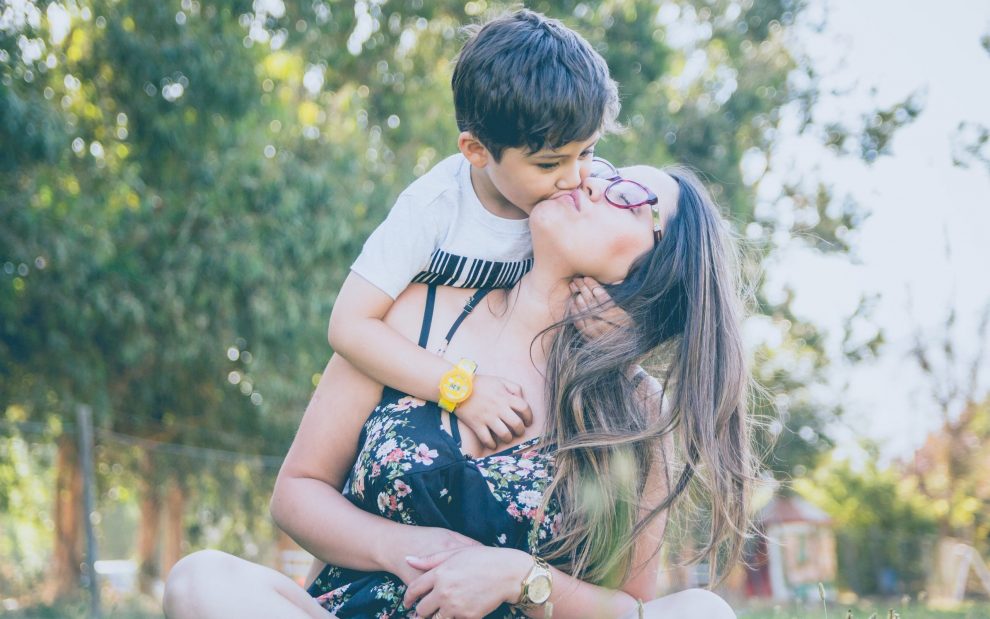The first two things I’d teach my kids about God come from Hosea’s sandwich board.
This prophet began his career with loud condemnation. His first sandwich board shrieked, “Repent of your sins! Now! Or be damned forever!” Then he fell in love. And, as Frederick Buechner tells the tale in Peculiar Treasures (Harper), Hosea changed his tune.
From Hosea’s revision, I’d borrow the first two lessons: God is love, and there’s no end to it.
1. God is love
I hope I’ve communicated God’s love in ways more powerful than words. From the first moment I held my children as infants, my touch told them they were held securely, tenderly, and in larger hands than mine. Any love I’ve given them since has been only a fraction of God’s. And any failure seems softened by a parent-God who never gets tired or cranky, never stops being compassionate.
Nasty notions afoot now resurrect God as severe judge and bold-of-lightning avenger. I downplay that idea and emphasize God with a large lap. Those who study the religious imagination find that people who see God as judge/master/punisher experience life as less gracious and grace-filled than people who see God as friend/spouse/lover. Life is tough enough. I won’t burden my kids with a God who wields a giant checklist.
2. God’s love never ends
When we gaze at the Pacific Ocean, the Rocky Mountains, or the Milky Way, we’re overwhelmed by immensity. Such scenes offer only a peek at the awesome mystery of God.
My children need a sense of the sacred, a tabernacle before which to bow and learn how small humans are in relationship to the divine. In a self-indulgent era, when little Brandi or Malcom can whine for anything and probably get it, an awareness of vast, divine dimensions gives humans a surer perspective on themselves.
Sometimes I think, “Ah—I’ve caught some flash of God’s hem. Through some peak experience, I’ve glimpsed the Holy One.”
But at the same time, “I ain’t seen nothing yet.” When I am drawn deeply into prayer, when I am suffused with love for another, when I stand transfixed before beauty, it’s only the beginning. Endless as ocean waves, God’s love beckons on and on—then on some more.
It’s not easy to translate infinity into language for children. To them I say, “God is full of surprises.” I teach them a gesture-prayer to begin each morning. Standing with hands open and arms outstretched tells God, “You’ll send marvelous surprises today. Alert me to your hide-and-seek tactics, your presence in unexpected places.”
3. God is good
Whenever I try to describe that quality, I remember a poster my 6-year-old made at Sunday School, colorfully proclaiming, “God is goo.”
“What?” I asked, puzzled.
From the first moment I held my children as infants, my touch told them they were held securely, tenderly, and in larger hands than mine.
“Teacher called time,” she replied.
To expand the platitude, I want my children not only to believe that God is good but also to seek God’s goodness in each day.
The 13th-century mystic Julian of Norwich wrote, “The fullness of joy is to behold God in everything.” Even small children can claim that joy: in dandelions and freckles, bear hugs and hot baths, warm bread and comfy sweatshirts.
Children’s five senses tingle with receptivity. If after a tough day the pizza drips fragrantly with mozzarella, the bedtime story delights, and the flannel sheets are warm, they find themselves embraced by God.
Jaded people take these pleasures for granted. Saintly folks welcome them as coming from God’s hand, brushed by the touch of the beloved.
When we are aware of the many ways and places the grace abounds, we live in gratitude, true to all we’ve been given. The essence of moral living isn’t fearful cowering before the law but the grateful response of resurrected people.
4. God chose you and shaped you in the divine image
From thousands of possibilities God created this unique blend of hair color, talents, and personality. Furthermore, God marked each child with an indelible family resemblance. Just as auburn hair or a prominent nose runs in the family, so each child bears the signs of divine origin and claims Jesus as oldest brother.
Spiritual writer and speaker Edwina Gateley’s story of an orphaned princess makes this idea concrete. When the king and queen knew that foreign invasion was imminent and that their family would be killed, they preserved their daughter’s life by sending her to live anonymously with a pig farmer.
Endless as ocean waves, God’s love beckons on and on—then on some more.
The child grew up unaware of her royal lineage until one day an old woman, who knew the truth, whispered, “you are the daughter of the most high king.” After that the princess still dug potatoes and fed pigs but with a new dignity, a restored sense of her noble heritage.
Cherishing all children, God designed some special task that only they can accomplish. I can’t tell my kids exactly what that task is, nor do I want them to feel burdened by it. Instead I hope their calling gives them a sense of being precious, no matter what they achieve.
Even young children feel pressure to succeed; parents fret whether preschool will adequately prepare them for Harvard. Being chosen by God means our personal successes or failures aren’t the important thing. It’s far more significant to be partners of Christ and channels for God’s creativity. If we’re geared only to the human scale measuring mistakes and achievements, we can easily get ulcers. God’s exquisite balance honors the paraplegic as much as the Olympic athlete.
I’ve been impressed by the quiet fidelity of people who’d never make an official “great” list but who tend this garden, anchor this family, program this computer, or tune this engine. People who cocreate with God bring meaning and reverence to whatever arena is theirs. I’ve always liked the idea that the real architects of world peace might be old people sitting in wheelchairs, seeming to stare into space.
Whatever outlet my children chose, regardless of its degree of success, it has vitality allied with God’s creative force.
5. God is within you
Perhaps they must grow into this understanding, but when I learned from Thomas Merton about the “point of pure truth,” a jewel-like spark that is God’s glory within, it brought me immense peace.
Oh, I still grieve, still go ballistic over trivia, still squander energy worrying. But when I center myself, I remember that no matter what happens, God is loving me more than I love myself, wanting only good for me.
People who cocreate with God bring meaning and reverence to whatever arena is theirs.
Even when I am too blind to recognize the yes contained within an apparent no or the hello hidden in goodbye, God is within me, easily accessible, longing to communicate. Regularly taking quiet time for this prayerful conversation is one of the most important things I could teach my children.
Holding this belief can also free my children from silly denominational disputes. Jesus settled that question once and for all when he told the Samaritan woman that God lodged neither in Jerusalem nor Samaria but secure in the human heart.
6. God is within others
The incarnate God can wear distressing disguises: as class bully, incompetent teacher, or arrogant cleric. Yet if God is in me, God is also in everyone else. That presence is the basis for respecting every form of human life. It made Jesus quite fond of people no one else would notice.
On one hand, his ideal challenges us; on the other it buoys us to recognize God in the fabric of human life.
In Les Misérables,” Jean Valjean says: “To love another person is to see the face of God.”
In Les Misérables,” Jean Valjean says: “To love another person is to see the face of God.” The loving relationships that fill my children’s lives ground them in God. Martin Luther King, Jr. called this network the beloved community.
Wherever people stand in relation to the institutional church, they can support and inspire us with great good humor. As Franciscan Father Richard Rohr reminds us, there is only one love, only one. That makes sacred the ground on which we walk. When my 20-year-old son stays up until 3 a.m. helping his sister pack for college or my 9-year-old comforts her brother who has just scraped his shin, something mysterious lights our chaotic home. Something of the divine stirs here.
7. God is greater than any hurt and forgives any wrong
If they’re anything like their mother, my kids will good up—royally. They should memorize this lesson.
Buried deep in my psyche is an image from Catholic grade school. Every day as we filed into that brick building, we’d pass a statue of the Sacred Heart of Jesus, his arms outstretched. At the time I didn’t fully appreciate that wide and welcoming embrace. But now that I know how badly I can err, I turn to a God who speaks through that image: “Did I mention that I love you? This much? No matter what?”
The projects can be placed on hold; the child is the immediate grace, the bearer of God in our midst.
Should we have any doubt about the forgiveness of God, we need only look into the face of Jesus. I especially like the story of the woman caught in adultery (John 8:1–11), not only for the nonjudgmental way Jesus treats her but also for his attitude toward her accusers. The Pharisees have attacked her viciously. Yet he responds to them nonviolently even after they embarrass and humiliate her publicly.
My children’s faces are open and fresh. I dread that they would ever become angry pickle faces poisoned by buried resentments. So they need to learn how good people express angry, resolve conflicts, ask for the grace to forgive, and work to reconcile. In these efforts they will catch a hint of God’s forgiveness.
8. My children have taught me more about God than I could ever teach them
I feel so utterly blessed and utterly undeserving to be my kids’ mom. Like St. Teresa of Avila, “I am helpless before love. I could be bribed by a sardine.” With my children I feel more vulnerable than with any adult I have ever loved. Perhaps experiencing the love of a parent for a child comes as close as humans can to knowing how God loves us.
Between God and us, as between parent and child, stretches a vast chasm. But as Thornton Wilder wrote, “the bridge is love, the only meaning, the only survival.” I’ve been privileged to walk that bridge.
Sometimes stubborn, sometimes obnoxious, my children have nevertheless helped me order priorities. Childhood, like life itself, is fleeting. Given such brief space, we must build not our résumés nor our gross domestic product nor our efficiency index but our relationships.
When she was 3, Katie used to turn my face away from my computer, thrust the keyboard aside, and plop squarely into my lap. She was a tough teacher, but her lesson stuck.
The projects can be placed on hold; the child is the immediate grace, the bearer of God in our midst. Grubby and insistent, my children have helped me appreciate that through Jesus, God wrapped Godself in skin, becoming as small and approachable as a child and as blind to human faults.
The last thing I’d tell my children? “God became like you. How serendipitous!”
Image: Unsplash/Alvaro Reyes















Add comment